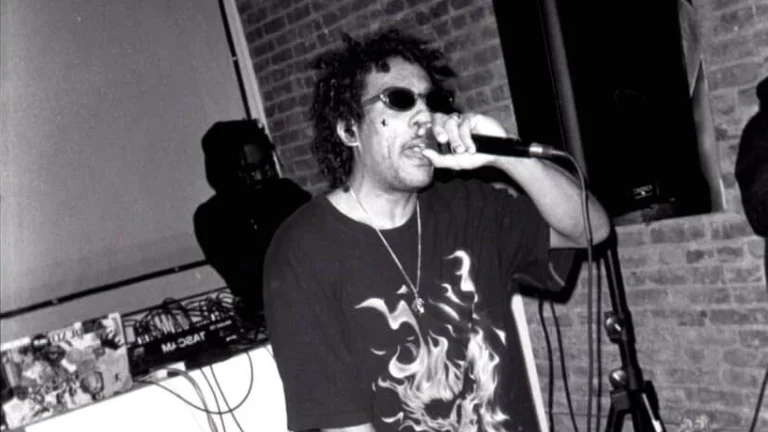When the Atlanta-based artist Imp decided to finish the album they and their best friend and fellow Georgian producer Fendi Pendergrass had started before Fendi’s passing, it wasn’t a creative decision as much as it was a kind of moral responsibility. The beats had been sitting there unfinished, gathering dust, until Imp decided to do something about them. So Thy Flesh Consumed became a vow, a way to give those sounds life again and to honor the friend who once told them, “Spit that grimy shit.”
Imp gave in to their better instincts and rounded a project with big emotions, gloriously hip collaborators, and the most innovative, sly-groove drum sounds on a slow-swing structure. This is the duo’s second collaborative project, continuing the familiar textures and cohesive interplay of the first, Pearls Before Swine. And maybe it’s the circumstances surrounding its release, but this one sounds requiem-aspiring. The production sticks close to Fendi’s beloved style: dusty drums, warped soul loops, and murky NYC boom-bap grit. Meanwhile, there’s a clearly perceptible teary quality behind Imp’s hammer-nail flow, a crack around the edges, tremor beneath the hardness.
That energy bleeds straight into the opening pithy track, “air hike.” It starts with an almost offhand interview-type discourse showing us a glimpse of the artist before his music:
“What’s your favorite color?” the interviewer asks.
His response: “Success.”
“What’s the best advice somebody has ever given you?”
“None.”
It’s a throwaway moment at first, sounding both playful and fun, but it catches you, indicating the loneliness of someone who’s had to figure it out alone—whatever “it” may be.
Cue in the beat, and the bars tumble out sharp and unfiltered. “I don’t bluff, I may be the hardest,” they rap, “Check the books, I made the volumes.” They do so without missing a beat, but when the track closes with Imp asking Fendi how he feels about it, there’s a bittersweet sting, a falter in their voice. In fact, this nostalgic act is invoked at the end of every track, where Imp splices in snippets of old studio chatter or Fendi’s laughter, transporting us to cramped basements, late-night moments of creativity, best friends sharing takeout, and wilding out over a dope beat. It pulls in the spirit of Fendi Pendergrass. And when the next track rolls in, it carries that same afterglow.
“headphone blues,” which widens the emotional scope, slides in on a smooth, jazzy backdrop, leaving Imp’s gravelly voice to bounce off it with an unexpectedly funny, off-kilter charm. St. Louis‑based rapper/producer Kaffo the Sensei, Atlanta’s john.AVERAGE, and featured verses from Tardia and devineabstract help Imp capture exhaustion, self-doubt, anxiety, imploring them to sift through the rubble for material that forms the very foundation of this album. Kaffo’s verse anchors the song: “Some days it don’t feel right to write at all / headaches really had me take more than Tylenol to calm my thoughts.”
But we all know about pain and its complicated effects. By the time “the difference” rolls in, Imp and their guests, ILL KALIL and VENMC, have shifted gears. The soulful, slightly sinister production sets the stage for a conversation about authenticity and betrayal. “Miss me with the dead alliances, I’m Liu Kang,” ILL KALIL warns, flame-throwing through fake connections. VENMC follows up: “What’s the difference between me and you? I speak the truth when I say I never needed you.” The verses feel like middle fingers to the industry’s hypocrisy, but also to the shallow alliances that fracture real friendships, a contrast made all the more poignant knowing this album is a dialogue with a friend they lost. But the dreary mise en scène behind the lyrics prevents them from veering too far from a referential, vaguely distraught atmosphere.
So Imp attempts an armor, a sort of poker-face attitude. That armor gleams in the album’s middle stretch, keeping the record from collapsing into sentimentality. “Arcanine” comes with the chest-puffed swagger of a rapper walking in his element. “I’m in the game like EA, these niggas not in the list,” they claim. The beat adds a layer of bluster: a militaristic style that recalls early 2000s mixtape grit—with the call and response structure in the hook, it’s even exciting.
And just when the mood hits full stride, Imp hops on a diss track with GRETZKY DA SUMO and Day Tripper, serving a cheeky pivot that serves to inject if nothing but a burst of humor, and then they rein in the vanity before it ventures on to dodgy insincerity. Still, the “bite” here carries less ego and a hint of silliness in its sway: “My raps passed the polygraph, these other rappers pass a stool.” You can practically hear Imp’s grin in that line and his love for grimy wit.
By the time the final track “borrowed time” unfolds, what little remnant of aggression remains softens into ache. The lo-fi production gives Killian’s ethereal vocals room to float, their gentleness offsetting Imp’s confessional tone. “Peace of mind is a commodity,” he admits, “I walked the trails of sleeping giants tryna find solace.”
And then, as if to release that weight, to find a release, the music ends with the most poignant scene: a recording of the two best friends in the studio, trading bars and laughter, romping in the sheer joy of creation. It’s a fitting coda for an album built on memory and motion. Thy Flesh Consumed is a collaboration fulfilled; a communion across life and death. While Imp’s voice carries the weight of two artists, their layered delivery unifies the presence of both. What comes through most is that Imp isn’t just honoring Fendi’s craft, but the way he animated every room he worked in. And yes, Fendi would have very much loved it; art, like their friendship, that transcends life and death.





